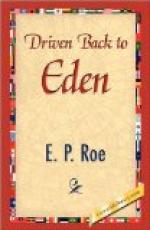I had watched our maturing corn with great satisfaction. For a long time Merton had been able to walk through it without his straw hat being seen above the nodding tassels. One day, about the 20th of the month, Mr. Jones came over with some bundles of long rye straw in his wagon, and said, “Yer can’t guess what these are fer.”
“Some useful purpose, or you wouldn’t have brought them,” I replied.
“We’ll see. Come with me to the corn patch.”
As we started he took a bundle under his arm, and I saw that he had in his hand a tool called a corn-knife. Going through the rows he occasionally stripped down the husks from an ear.
Finally he said: “Yes, it’s ready. Don’t yer see that the kernels are plump and glazed? Junior and I are going to tackle our corn ter-morrow, and says I to myself, ’If ourn is ready to cut, so is neighbor Durham’s,’ The sooner it’s cut after it’s ready, the better. The stalks are worth more for fodder, and you run no risk from an early frost, which would spile it all. You and Merton pitch in as yer allers do, and this is the way ter do it.”
With his left hand gathering the stalks of a hill together above the ears, he cut them all olf with one blow of the corn-knife within six inches of the ground, and then leaned them against the stalks of an uncut hill. This he continued to do until he had made what he called a “stout,” or a bunch of stalks as large as he could conveniently reach around, the uncut hill of stalks forming a support in the centre. Then he took a wisp of the rye-straw, divided it evenly, and putting the ends together, twisted it speedily into a sort of rope. With this he bound the stout tightly above the ears by a simple method which one showing made plain to me.
“Well, you are a good neighbor!” I exclaimed.
“Pshaw! What does this amount to? If a man can’t do a good turn when it costs as little as this, he’s a mighty mean feller. You forget that I’ve sold you a lot of rye-straw, and so have the best of yer after all.”
“I don’t forget anything, Mr. Jones. As you say, I believe we shall ‘make a go’ of it here, but we always remember how much we owe to you and Junior. You’ve taken my money in a way that saved my self-respect, and made me feel that I could go to you as often as I wished; but you have never taken advantage of me, and you have kept smart people from doing it. Do you know, Mr. Jones, that in every country village there are keen, weasel-like people who encourage new-comers by bleeding their pocket-books at every chance? In securing you as a neighbor our battle was half won, for no one needs a good practical friend more than a city man beginning life in the country.”
“Jerusalem! how you talk! I’m goin’ right home and tell my wife to call me Saint Jones. Then I’ll get a tin halo and wear it, for my straw hat is about played out;” and away he went, chuckling over his odd conceits, but pleased, as all men are, when their goodwill is appreciated. If there is one kind of meanness that disgusts average human-nature more than another it is a selfish, unthankful reception of kindness, a swinish return for pearls.




